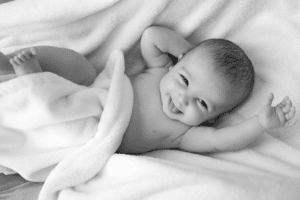Whether you’re a parent or pediatrician, there are many opinions on what age is best for a child to begin attending daycare. Some believe the earlier, the better, so there’s less separation anxiety. Others believe that sending the child to daycare when he is older allows for proper parental bonding.

There are a dozen other factors to consider, as well, such as the child’s immune system, social tendencies, and the parent’s work schedule. Some parents must go back to work six weeks after delivering a baby, while others can wait a few years and easily resume their occupation.
While there’s no right or wrong answer, most pediatricians recommend children attend daycare beginning around one year old.
The Best Age to Start Daycare
Many pediatricians recommend children start daycare around age one. There are several reasons for this:
Immunity
Babies younger than one year have a developing immune system. Letting your infant’s immune system mature before enrolling them in daycare would help them stay well.
Parental Attachment

12 months could be the sweet spot for enrolling your child in daycare because it allows parental-child bonding but the child isn’t old enough to experience severe separation anxiety during drop off.
Better Behavior
One study noted that children enrolled in daycare at 12 months behaved better than their peers who stayed home. This is because children at this age are budding socially and have ample opportunity to learn important social skills, such as sharing toys, playing with friends, and communicating with baby sign language. Babies who don’t have regular peer interaction miss out on opportunities to grow and integrate these social skills.
The Earliest Age to Start Daycare
Studies show there are benefits to enrolling a child younger than 12 months. Children enrolled at six months have better cognitive and social skills than peers who stay at home.
Penguin Crossing Academy enrolls infants as young as six weeks. We ensure quality care for these precious little ones and give them the care and attention they need to grow and thrive.
The Worst Age to Enroll in Daycare
Knowing the best age to start daycare begs the question: is there a bad age to enroll in daycare?
Generally speaking, children aged three and four have the hardest time transitioning to daycare, especially if they’ve exclusively stayed home with a parent and not had other forms of childcare (like a relative or friend watching them part-time, or an early preschool program).
This age is the hardest because children are used to spending all their time with their parents. Such a drastic change in routine can cause a lot of anxiety, hyperactivity, and behavioral issues in children.
But this doesn’t mean enrolling your three-or-four-year-old will be disastrous! At Penguin Crossing Academy, we have compassionate teachers who will help your child quickly acclimate to a daycare setting. We have an excellent early preschool curriculum that lets your child get a head start on kindergarten skills.
Age Doesn’t Matter–As Long As Care is Quality
While there is much debate about the best time to enroll a child in daycare, the bottom line is that daycare can benefit children of every age–as long as the daycare provides quality care. There’s a huge difference between a daycare that lets children play all day and a daycare that provides predictable routines, age-appropriate education, nutritional meals, and creative playtime.
Penguin Crossing Academy provides outstanding care to children enrolled in our program. It doesn’t matter what age your child begins daycare, at Penguin Crossing Academy, they will be cared for by kind and compassionate teachers who want to see them reach their highest potential.
Children in our program receive age-appropriate education that grows their fine and gross motor skills, social skills, and early educational knowledge. We also provide ample opportunity for creative play, both outdoors and indoors, and emphasize physical activity.
